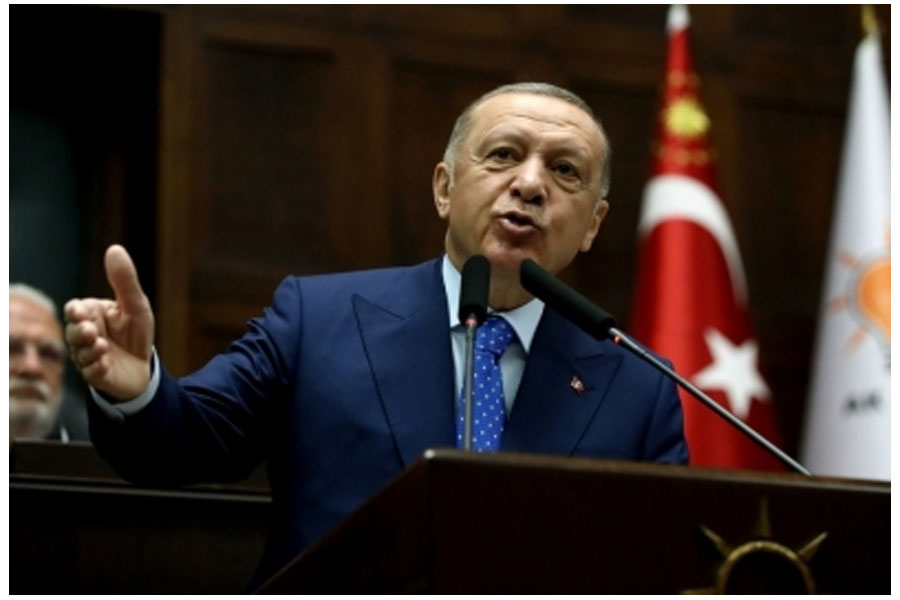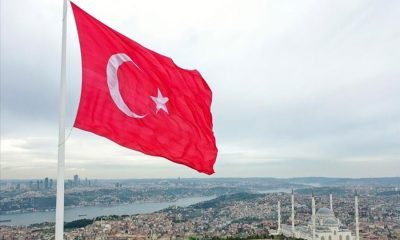International News
Turkey to freeze Finland, Sweden’s NATO bids if they fail to keep promises: Prez

Turkey will suspend Finland and Sweden’s NATO accession process if they do not keep promises on counter-terrorism, Turkish President Recep Tayyip Erdogan said.
“I would like to remind you that we will freeze the process if they do not take the necessary steps to meet our terms,” Erdogan added on Monday at a press conference after a cabinet meeting in the capital Ankara, adding Sweden was “not showing a good image” for now.
“Our stance is very clear. The rest is up to them,” he said.
NATO’s 30 member states signed accession protocols for Sweden and Finland in early July, starting the process to admit the two Nordic countries into the military alliance, Xinhua news agency reported.
The next step is for the parliaments of all NATO members to ratify their accession to NATO.
Finland and Sweden’s NATO bid was initially blocked by Turkey, which accused them of “supporting” anti-Turkish terrorist groups as they rejected Ankara’s extradition requests for suspects affiliated with the outlawed Kurdistan Workers’ Party (PKK) and the Gulen movement.
The PKK, listed as a terrorist organisation by Turkey, the US and the EU, has been rebelling against the Turkish government for more than three decades.
The Gulen movement is led by and named after the US-based Muslim preacher Fethullah Gulen who is regarded by his followers as a spiritual leader. The Turkish government accuses the movement of masterminding the 2016 failed coup in which at least 250 people were killed.
On June 28, Turkey, Sweden and Finland agreed on a memorandum of understanding (MoU) before Ankara lifted its veto ahead of the NATO Madrid summit.
In the MoU, Finland and Sweden pledged to support Turkey’s fight against terrorism, and agreed to address Turkey’s “pending deportation or extradition requests of terror suspects expeditiously and thoroughly”.
Crime
ISI fans anti-India narrative in Bangladesh to rig Feb polls: Intelligence inputs

New Delhi, Dec 25: The ISI’s role in attempting to fan an anti-India sentiment in Bangladesh is most certainly confirmed, given the rhetoric by some Pakistan news outlets and a few leaders. Some media outlets have recklessly blamed India’s Research and Analysis Wing (RAW) for the murder of student leader Sharif Osman Hadi. The claim has been made at a time when the Bangladesh authorities themselves are unclear about the killers and their motive.
Adding to the fire is a fiery video message by Kamran Sayeed Usmani, a leader of Pakistan’s ruling party, PML-N, who went on an anti-India rhetoric.
While blaming New Delhi for the mess in Bangladesh, he threatens that missiles would be directed at India. Officials say that these are reckless messages only aimed at ensuring that the violence continues in Bangladesh.
The official further pointed out that there is a pattern to such messaging. The intention is to internationalise the domestic problems in Bangladesh, and by dragging India into it, these elements are trying to achieve just that. Not a single country except Pakistan has blamed India for the mess that is on in Bangladesh. In fact, it was the Pakistan deep-state that orchestrated this mess by first ensuring that Sheikh Hasina was ousted and the Jamaat-e-Islami was in the driver’s seat. The international community is aware that the Jamaat is a puppet of the ISI.
Following the Liberation War, it was the ISI and Jamaat which planned large-scale illegal immigration into India so that demographic changes could be executed. Intelligence Bureau officials who are keeping a close watch on the developments in Bangladesh say that the ISI is playing two games here.
Pakistan has been desperately seeking revenge against India since it lost the 1971 war, which led to the creation of Bangladesh. Hence, there has been the manufacturing of a false narrative so that the people of Bangladesh are pitted against India.
The ISI realises that it would need a Jamaat government or one backed by it to be in power. Parties like the Bangladesh National Party (BNP) have been showing signs of moving away from the Jamaat and ISI, as the party wants a developed and not a radical nation.
The signs became clear when the BNP distanced itself from the Jamaat and decided to contest the elections on its own.
This shift has hurt the ISI and made it insecure, as the BNP does have every chance of winning the elections. Pollsters have predicted a win for the BNP in the absence of the Awami League, which has been banned from contesting the elections.
Former Prime Minister and BNP chief Khaleda Zia is unwell, and this could well be a sympathy factor for the party in the February 2026 polls. The BNP cadre will also be bolstered by the return of Zia’s son, Tarique Rehman, who is set to visit Bangladesh after 17 years in exile.
All these factors have made the ISI and Jamaat uneasy, and they feel that the elections can slip out of their hand.
Bangladesh watchers say that the elections are unlikely to be put off as pressure from the international community is building up. Experts say that the elections in Bangladesh are most likely to go as per schedule, but the fairness of it remains a question mark.
Intelligence agencies say that the violence is being fanned by the Jamaat-controlled groups so that the people do not come out and vote in large numbers. They want to create fear in the minds of the people so that they stay indoors when the elections are on.
Many Awami League supporters are unlikely to vote as the party is banned. Some are likely to shift their loyalties to the BNP, and if this does happen, then the party’s chances of winning the elections will only increase.
Analysts say that there is either a chance of a short postponement of the elections or a completely unfair one being conducted.
The ISI is doing everything possible to rig the polls by inciting violence. While trying to rig the polls, the ISI is also dishing out a false narrative to create an anti-India sentiment among the people.
Business
India-New Zealand FTA: PM Modi, Luxon aim to double bilateral trade over 5 years

New Delhi, Dec 22: Prime Minister Narendra Modi held a telephone conversation with New Zealand’s Prime Minister, Christopher Luxon, on Monday as the two leaders jointly announced the successful conclusion of the historic, ambitious and mutually beneficial India-New Zealand Free Trade Agreement (FTA).
During the conversation, both leaders expressed confidence in doubling bilateral trade over the next five years as well as an investment of $20 billion in India from New Zealand over the next 15 years.
The negotiations began in March this year and the two leaders concluded the FTA in a record time of nine months, reflecting the shared ambition and political will to further deepen ties between the two countries, according to a statement from Prime Minister’s Office (PMO).
“The FTA would significantly deepen bilateral economic engagement, enhance market access, promote investment flows, strengthen strategic cooperation between the two countries, and also open up new opportunities for innovators, entrepreneurs, farmers, MSMEs, students and youth of both countries across various sectors,” said the statement.
The leaders also welcomed the progress achieved in other areas of bilateral cooperation such as sports, education, and people-to-people ties, and reaffirmed their commitment towards further strengthening of the India-New Zealand partnership.
This historic FTA eliminates and reduces tariffs on 95 per cent of New Zealand’s exports – among the highest of any Indian FTA – with almost 57 per cent being duty-free from day one, increasing to 82 per cent when fully implemented, with the remaining 13 per cent subject to sharp tariff cuts.
It puts New Zealand exporters on an equal or better footing to our competitors across a range of sectors and opens the door to India’s rapidly expanding middle class, according to an official statement from New Zealand.
“The Indian economy is forecast to grow to NZ$12 trillion by 2030. The India-NZ Free Trade Agreement unleashes huge potential for our world-class exporters to the world’s largest country and will significantly accelerate progress towards New Zealand’s ambitious goal of doubling the value of exports over 10 years,” it added.
International News
‘Bodes ill for democratic process’: Tharoor flags attacks on media amid violence in Bangladesh

New Delhi, Dec 20: Congress MP Shashi Tharoor on Saturday voiced serious concern over what he described as targeted attacks on prominent media houses in violence-hit Bangladesh, while also condemning the forced suspension of visa services at Indian Assistant High Commissions in Khulna and Rajshahi amid worsening security conditions.
Bangladesh has witnessed a fresh wave of unrest following the death of radical Islamist leader Sharif Osman Hadi, who rose to prominence during the 2024 student movement that culminated in the ouster of the then Prime Minister Sheikh Hasina.
The killing has triggered widespread protests, with violence reported in Dhaka and several other parts of the country.
Protests over the death of Inqilab Moncho leader Hadi have continued to escalate, and the mobs targeted leading media organisations and locations associated with Bangladesh’s secular legacy. Reports of arson and vandalism at media establishments have sparked alarm both within the country and internationally.
Reacting to the developments, Tharoor said the attacks on the press strike at the core of democratic values.
In a post on X, he said: “Deeply concerned by the reports from Bangladesh. The targeted mob attacks and arson at the offices of Prothom Alo and The Daily Star are more than just an assault on two media houses; they are an assault on the freedom of the press and the very foundation of a pluralistic society.”
The Congress MP also expressed concern about the safety of journalists, including senior editors. He said he was worried about the well-being of Editor Mahfuz Anam and other media professionals working under increasingly hostile conditions.
Amid the unrest, India was compelled to shut down two visa application centres in Bangladesh, citing security threats. In Rajshahi, a march was organised by a group called ‘July 36 Mancha’ towards the Indian Assistant High Commission. The procession advanced towards the diplomatic mission but was halted midway following police intervention.
Similar demonstrations were also reported in Khulna, prompting authorities to suspend visa-related operations at both locations.
Condemning the disruption, Tharoor said the suspension of services would have far-reaching consequences.
“The forced suspension of visa services at the Indian Assistant High Commissions in Khulna and Rajshahi, driven by escalating security threats, is a major setback. This disruption directly impacts students, patients, and families who were finally seeing a glimpse of normalisation in cross-border mobility,” he said.
With Bangladesh scheduled to hold national elections on February 12, 2026, Tharoor warned that this atmosphere of violence and intolerance “bodes ill for the democratic process”.
The Congress leader also outlined steps for the Muhammad Yunus-led interim government to ensure stability and democratic continuity in the country.
Emphasising the need for decisive action, he said: “Protection of Journalists: Journalists should not have to post frantic messages for their lives while their offices burn. Mob rule must not be allowed to prevail.”
He further mentioned that the security of diplomatic facilities must be ensured to maintain vital people-to-people ties. “Extra protection must be provided for targeted embassies & consulates,” he said.
“Constructive dialogue must replace ochlocracy if the country is to survive this transition with any semblance of democracy. Interim Chief Mohammed Yunus must take the lead personally to ensure this,” he added, stressing the need to restore the calm.
Tharoor underscored that peace in Bangladesh holds significance beyond its borders, noting that stability in the country is “vital” for South Asia as a whole.
“We hope for a return to peace and a safe environment where the voice of the people is heard through the ballot, not through violence and intimidation,” he added.
-

 Crime3 years ago
Crime3 years agoClass 10 student jumps to death in Jaipur
-

 Maharashtra1 year ago
Maharashtra1 year agoMumbai Local Train Update: Central Railway’s New Timetable Comes Into Effect; Check Full List Of Revised Timings & Stations
-

 Maharashtra1 year ago
Maharashtra1 year agoMumbai To Go Toll-Free Tonight! Maharashtra Govt Announces Complete Toll Waiver For Light Motor Vehicles At All 5 Entry Points Of City
-

 Maharashtra1 year ago
Maharashtra1 year agoFalse photo of Imtiaz Jaleel’s rally, exposing the fooling conspiracy
-

 National News1 year ago
National News1 year agoMinistry of Railways rolls out Special Drive 4.0 with focus on digitisation, cleanliness, inclusiveness and grievance redressal
-

 Maharashtra1 year ago
Maharashtra1 year agoMaharashtra Elections 2024: Mumbai Metro & BEST Services Extended Till Midnight On Voting Day
-

 National News1 year ago
National News1 year agoJ&K: 4 Jawans Killed, 28 Injured After Bus Carrying BSF Personnel For Poll Duty Falls Into Gorge In Budgam; Terrifying Visuals Surface
-

 Crime1 year ago
Crime1 year agoBaba Siddique Murder: Mumbai Police Unable To Get Lawrence Bishnoi Custody Due To Home Ministry Order, Says Report


















